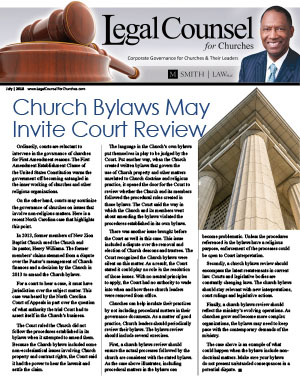Ordinarily, courts are reluctant to intervene in the governance of churches for First Amendment reasons. The First Amendment Establishment Clause of the United States Constitution warns the government off becoming entangled in the inner working of churches and other religious organizations.
On the other hand, courts may scrutinize the governance of churches on issues that involve non-religious matters. Here is a recent North Carolina case that highlights this point.
In 2013, former members of New Zion Baptist Church sued the Church and its pastor, Henry Williams. The former members’ claims stemmed from a dispute over the Pastor’s management of Church finances and a decision by the Church in 2013 to amend the Church bylaws.
For a court to hear a case, it must have jurisdiction over the subject matter. This case was heard by the North Carolina Court of Appeals in part over the question of what authority the trial Court had to assert itself in the Church’s business.
The Court ruled the Church did not follow the procedures established in its bylaws when it attempted to amend them. Because the Church bylaws included some non-ecclesiastical issues involving Church property and contract rights, the Court said it had the power to hear the lawsuit and settle the claim.
The language in the Church’s own bylaws put themselves in play to be judged by the Court. Put another way, when the Church created written bylaws that govern the use of Church property and other matters unrelated to Church doctrine and religious practice, it opened the door for the Court to review whether the Church and its members followed the procedural rules created in those bylaws. The Court said the way in which the Church and its members went about amending the bylaws violated the procedures established in its own bylaws.
There was another issue brought before the Court as well in this case. This issue included a dispute over the removal and election of Church deacons and trustees. The Court recognized the Church bylaws were silent on this matter. As a result, the Court stated it could play no role in the resolution of those issues. With no neutral principles to apply, the Court had no authority to wade into when and how these church leaders were removed from office.
Churches can help insulate their practices by not including procedural matters in their governance documents. As a matter of good practice, Church leaders should periodically review their bylaws. The bylaws review should include several exercises.
First, a church bylaws review should ensure the actual processes followed by the church are consistent with the stated bylaws. As the case above illustrates, including procedural matters in the bylaws can become problematic. Unless the procedures referenced in the bylaws have a religious purpose, enforcement of the processes could be open to Court interpretation.
Secondly, a church bylaws review should encompass the latest restatements in current law. Courts and legislative bodies are constantly changing laws. The church bylaws should stay relevant with new interpretations, court rulings and legislative actions.
Finally, a church bylaws review should reflect the ministry’s evolving operations. As churches grow and become more complex organizations, the bylaws may need to keep pace with the contemporary demands of the ministry.
The case above is an example of what could happen when the bylaws include non- doctrinal matters. Make sure your bylaws do not present unintended consequences in a potential dispute.

